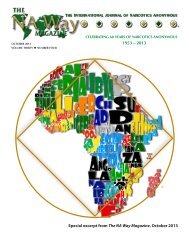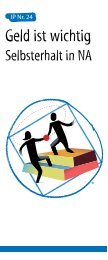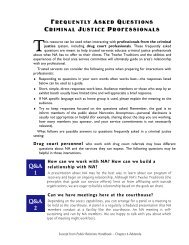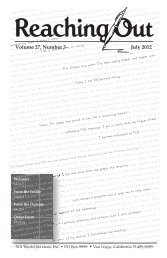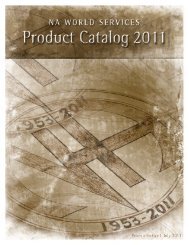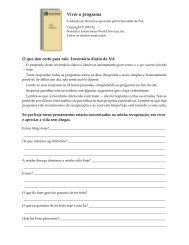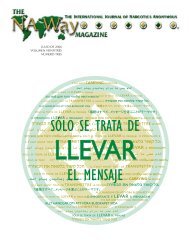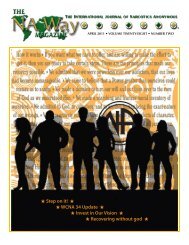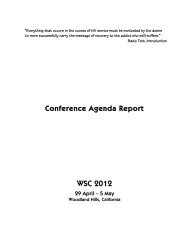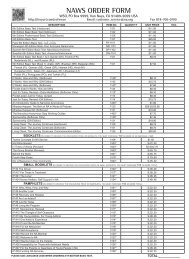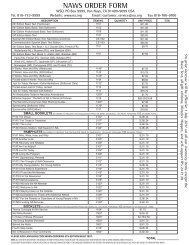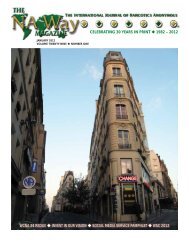Public Relations Handbook - Narcotics Anonymous
Public Relations Handbook - Narcotics Anonymous
Public Relations Handbook - Narcotics Anonymous
Create successful ePaper yourself
Turn your PDF publications into a flip-book with our unique Google optimized e-Paper software.
Training and preparing trusted servants Trusted servants should have information about the healthcare settings theywill be entering. Researching the profession or philosophies of an audience canhelp members anticipate questions and communicate more effectively. (SeeChapter Four for details about research and presentations). Trusted servants should be trained to interact in the various healthcare settingsthat exist in their community. Training guidelines could include updating allhealthcare audiences with current NA contact information, as well as ways torespond to a variety of requests made by healthcare professionals. Eachhealthcare setting is different; training can be tailored toward the specificcircumstances, concerns, and needs of the various settings. Trusted servants should be trained to use clear and concise language. This meansthat presenters avoid using NA jargon or slang. A committee may invite an NAmember who is also a healthcare professional or someone who understands thehealthcare profession, to give a presentation. We are more likely to reach anaudience when we are familiar with their practices and philosophies. The area may want to identify particular qualities of an ideal trusted servant forhealthcare settings. The ability to communicate articulately, presentation skills,experience in NA, and the ability to demonstrate recovery are some examplesof essential qualities for providing service in healthcare settings. Committeescan also review the Fourth Concept when identifying the ideal qualities of atrusted servant. Practicing a presentation for a nonaddict audience familiar with healthcarepractices can help trusted servants improve the effectiveness of thepresentation. Many facilities require volunteers to attend an orientation session. Trustedservants should be prepared to attend one of these sessions if required by thefacility. It is becoming more and more common for facilities to requirevolunteers to attend these kinds of“Researching theprofession or philosophiesof an audience can helpmembers anticipatequestions andcommunicate moreeffectively.”76 | Chapter 8 | Healthcareorientations. Healthcare professionals understandmedical models. Trusted servants needto be trained to describe NA’sapproach as an abstinence-basedprogram of recovery. Members caneducate professionals about ourprogram’s philosophy of completeabstinence using NA literature (such asthe Am I an Addict? IP) and relevantmaterials created by the committee. Members can explain to physicians thatNA views addiction as an illness and that we see this illness as affecting addictsphysically, emotionally, and spiritually. Trusted servants can also explain thatNA is a comprehensive, peer-support recovery strategy that allows manymembers to lead more productive lives. When explaining why NA is not a drug-replacement program, trusted servantscan rely on NA literature. (As an additional resource, see Chapter Seven’sdiscussion of drug replacement.) NA: A Resource in Your Community and the NA Membership Survey can be usefultools in healthcare settings. Trusted servants can order these materials bycontacting NA World Services.



